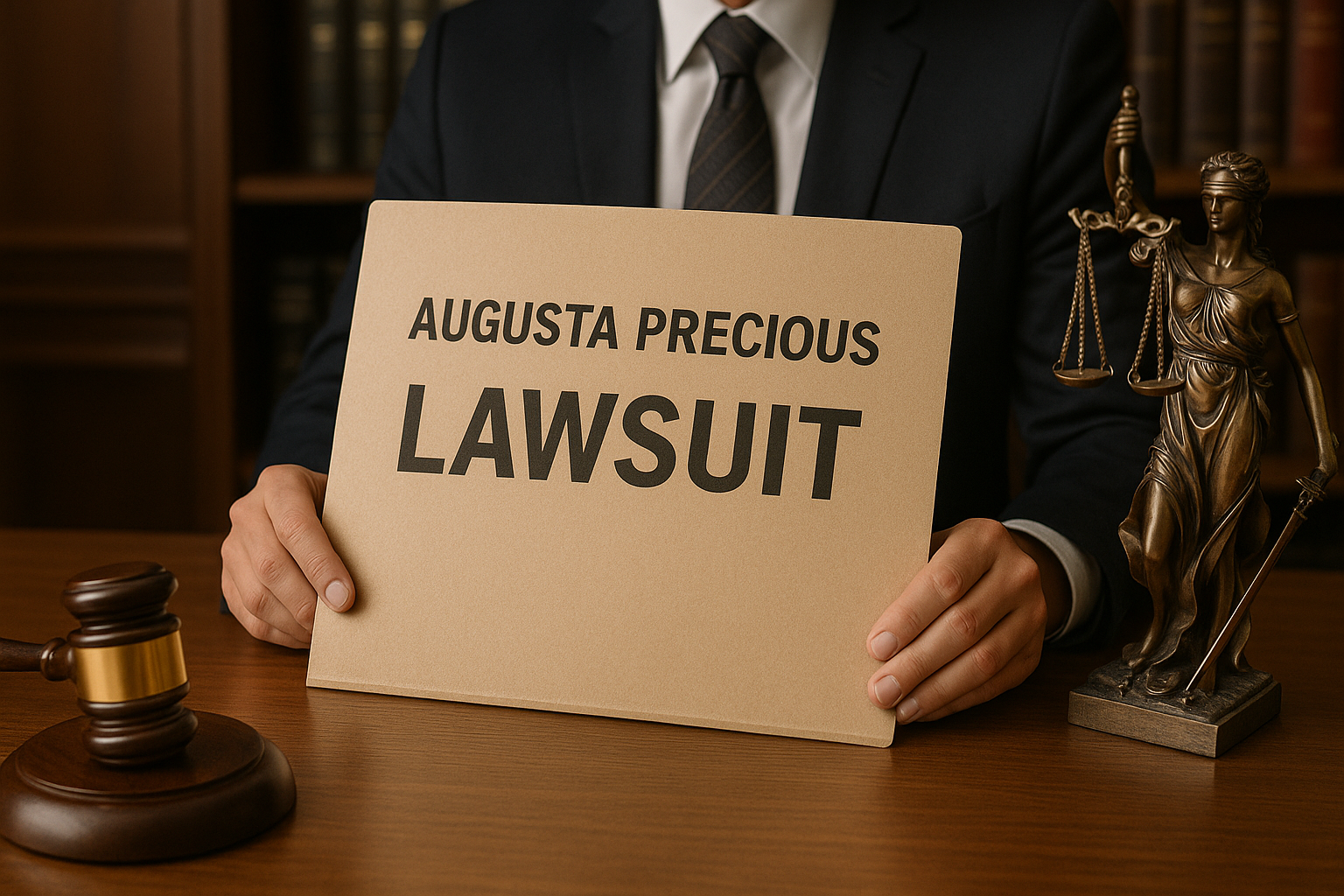The phrase “Augusta Precious Metals lawsuit” gets a lot of clicks, but it often creates more smoke than light. If you’ve seen headlines implying sweeping legal action against the company, it’s worth pausing to separate rumor from verifiable fact. Below, you’ll find a clear, up-to-date overview of what is—and isn’t—on the public record, plus practical investor takeaways about fees, disclosures, gold IRAs, and where such “lawsuit” narratives usually come from.
Snapshot of the company and why this topic trends
Augusta Precious Metals is a U.S.-based precious-metals dealer that focuses heavily on gold and silver IRAs for retirement savers. The firm is frequently mentioned in retirement forums, review sites, and comparison blogs, which is precisely why “lawsuit” stories spread quickly—retirement and metals investing draw strong opinions, and affiliate content thrives on dramatic headlines. What matters for investors is not noise, but whether reputable third-party records show consumer lawsuits or regulatory actions tied to the company.
Is there actually a consumer lawsuit against Augusta Precious Metals?
As of 6 September 2025, there is no verified customer class action or government enforcement action on the public record against Augusta Precious Metals. Independent, third-party listings show the business as BBB accredited with an A+ rating and—crucially—no complaints listed in the current three-year reporting window. That profile doesn’t make the company perfect, but it is a straightforward datapoint investors can check for themselves when weighing “lawsuit” headlines against documented history.
Where the “lawsuit” narrative usually comes from
Search results today are filled with blog posts that present a scandalous headline and then pivot into generic investing tips or comparisons to competitor firms. Many of those pages do not cite primary dockets, attorney general filings, or case numbers; instead, they lean on speculation or unrelated industry enforcement actions to imply a link to Augusta. The company itself has published rebuttals pointing out this pattern of click-driven rumor amplification. As a reader, the key is to ask: Is there a case number, a regulator’s release, or a docket you can open? If not, you’re likely looking at marketing content rather than legal fact.
Industry context: enforcement happens—verify who it involves
It’s absolutely true that precious-metals dealers have drawn serious enforcement in recent years; several high-profile actions targeted firms accused of misleading seniors or charging extreme markups. Those cases show regulators will act when evidence supports it. But citing industry actions against other companies to imply wrongdoing by Augusta is misleading unless a filing actually names Augusta. Distinguish between industry enforcement news and company-specific records.
Allegations you’ll see online—and what’s documented
Common internet claims include misrepresentation of gold IRA benefits, hidden fees, or patterns of delivery issues. Allegations require proof; in the absence of court filings or regulator orders naming the company, these remain unsubstantiated assertions. By contrast, what is documented is the firm’s current BBB standing and complaint count of zero in the active window. If an article cannot direct you to a regulator’s page or docket that you can view independently, treat it as commentary, not evidence.
Legal fine print investors should actually read.
Even when a company has a clean public record, you should scrutinize the contract terms because your rights flow from that agreement. Augusta’s posted terms include an arbitration and class-action waiver, a standard clause across many financial services. That doesn’t indicate a problem by itself, but it changes how disputes are resolved. Before you buy, understand what arbitration means for discovery, appeals, timelines, and potential remedies. Keep a dated copy of any terms you accepted.
Fees, minimums, and markups: what to ask before you invest
Two cost buckets matter with any precious-metals IRA: ongoing account/depository fees and the spread/markup on the metal itself. Augusta publicly emphasizes a $50,000 minimum investment for IRAs, which positions the service toward higher-balance investors. Independent reviews also note that minimums and remind readers to keep allocations modest in a diversified plan. Before funding, request a written, itemized schedule of annual custodian fees, storage charges, shipping/insurance, and the per-product markup range you should expect to pay.
How gold IRAs work (and why complaints often come from expectations, not fraud)
A gold IRA is a self-directed IRA holding IRS-approved bullion or coins, custodied by a qualified trustee and stored at an approved depository—never at home if you want to preserve the IRA’s tax status. Liquidity is different from selling an ETF; metals must be shipped, verified, and processed, which takes time and may involve bid-ask spreads larger than what stock investors expect. Many frustrations you see online stem from these structural factors rather than misbehavior, which is why understanding mechanics up front is so important.
Practical due diligence steps (use these anywhere, not just with Augusta)
Start by verifying independent records: BBB file, state business registration, and—when claims are made—court dockets or regulator press releases with case numbers. Ask the dealer to disclose markup ranges on each product, not just “competitive pricing” language. Confirm where assets will be stored, whether storage is segregated or commingled, and the exact annual cost. Review the custodian agreement because custodians—not dealers—administer IRA rules and fees. Finally, decide on allocation using a plan you can defend; many mainstream sources suggest keeping precious metals to a minority slice of a diversified portfolio rather than going “all in.”
What about one-off business disputes I’ve seen mentioned?
In competitive markets, it’s not unusual to see business-to-business disagreements over marketing or contracts wind up on a docket; these disputes differ from consumer-protection or fraud actions and typically don’t allege investor harm. When you encounter references to such cases in blogs, check the actual court entry to see who sued whom, when, and for what—and avoid extrapolating beyond what the filing says. If you can’t access a docket or the article doesn’t provide one, treat it cautiously.
Investor insights: converting noise into a decision you can defend
If you’re evaluating Augusta—or any metals IRA provider—base your decision on written disclosures and verifiable records. Confirm the present BBB status, read the arbitration clause, and understand that metals IRAs introduce storage logistics and spreads that differ from mainstream securities. If you want simple liquidity and transparent pricing, compare your options to ETFs or closed-end funds. If you wish to have physical exposure held in a retirement account, ensure you’re comfortable with the timeline, fees, and markup realities. No marketing page or rumor headline will matter as much as the documents you sign and the portfolio plan you actually follow.
Bottom line
The “Augusta Precious Metals lawsuit” phrase largely reflects rumor cycles and comparison-site marketing rather than documented, company-specific legal actions against consumers. Today’s public record shows no consumer lawsuits or regulatory enforcement naming the company, and the firm holds an A+ BBB rating with zero complaints listed in the current period. That doesn’t mean you should invest unthinkingly; it means you should judge the company the way professionals do—by reading the contract, confirming fees and markups in writing, verifying independent profiles, and sizing any metals allocation to fit a balanced, long-term plan.




